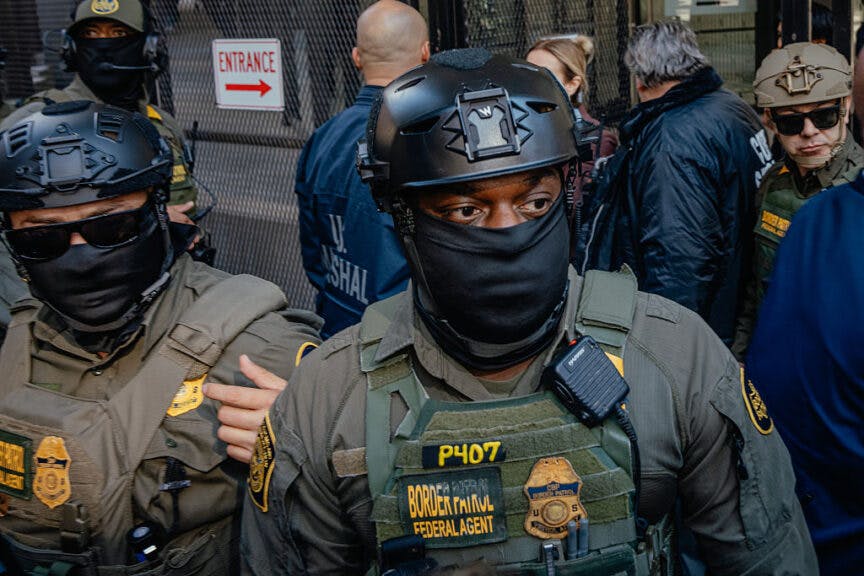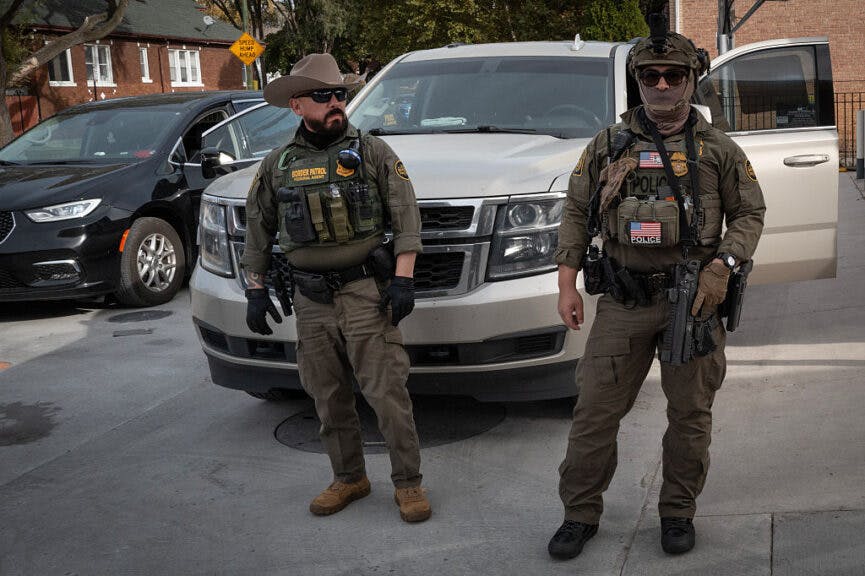The recent attempted shooting of Border Patrol agents in Chicago and the public warning to ICE by New York City mayor-elect Zohran Mamdani are not isolated events. They signal something far more dangerous: the erosion of operational legitimacy for federal immigration enforcement inside the very cities where the rule of law should be most secure.
As an Army veteran and former Border Patrol agent, I have seen the indicators of insurgency and state destabilization around the world. I never expected to see them unfold here, in our own communities, under our own flag.
What’s happening now is not a series of policy disagreements. It is a systemic breakdown of enforcement authority, political clarity, and institutional courage. And at its core lies the question every Republic must eventua…
The recent attempted shooting of Border Patrol agents in Chicago and the public warning to ICE by New York City mayor-elect Zohran Mamdani are not isolated events. They signal something far more dangerous: the erosion of operational legitimacy for federal immigration enforcement inside the very cities where the rule of law should be most secure.
As an Army veteran and former Border Patrol agent, I have seen the indicators of insurgency and state destabilization around the world. I never expected to see them unfold here, in our own communities, under our own flag.
What’s happening now is not a series of policy disagreements. It is a systemic breakdown of enforcement authority, political clarity, and institutional courage. And at its core lies the question every Republic must eventually answer: are we still a sovereign people — capable not only of defending our borders, but of defending the meaning of citizenship itself?
The Question Every Veteran Is Asking
This Veterans Day, many of us are reflecting on what we fought for, and increasingly, we are asking the question: What was it all for?
Across the West, veterans from Normandy to Fallujah are feeling the same pain. One British WWII veteran, Alec Penstone, broke down on camera when asked what Remembrance Sunday meant to him.
I can see in my mind’s eye rows and rows of white stones — hundreds of my friends and everybody else who gave their lives. For what? A country of today? No, I’m sorry. Their sacrifice wasn’t worth the result of what it is now. What we fought for was our freedom, and it’s a darn-sight worse now than when I fought for it.
That grief is not confined to Britain. It’s the recognition of a veteran’s intuition that something deeper is unraveling, not just the loss of order, but a whole-of-society assault aimed at eroding the very freedoms we fought for: life, liberty, and property.
Because at the heart of every service member is one thing above all: home. Even when deployed abroad, our thoughts drift back to the people and principles we left behind. When we hang up the uniform, we hope the fight was worth it. We hope the home we return to still resembles the one we fought for.

Jamie Kelter Davis/Getty Images
The War Has Come Home
Today, we see familiar signs of foreign wars on our own streets: the normalization of political violence, the collapse of enforcement authority, the ideological capture of civil institutions, and the strategic demoralization of those still willing to stand post. These are no longer foreign indicators, but domestic realities.
What we are seeing in the streets of Chicago and New York is not random violence; it is the very thing we swore an oath to protect against. It is insurgent in nature, symbolic in purpose, and deeply strategic in effect.
When Border Patrol agents are ambushed in an American city, it is not merely a crime; it is an assault on the institution charged with upholding the boundary of American citizenship.
Citizenship is more than paperwork. It is the covenant that binds a people; the shared rights, duties, and the consent to govern ourselves together. Without it, sovereignty is an empty word.
And yet, in Chicago, ICE and Border Patrol, the frontline forces tasked with enforcing the lawful boundaries of citizenship, came under literal fire. When those who defend the meaning of citizenship are attacked, political independence itself lies wounded. Sovereignty survives only if citizenship is defined and defended. That is the first duty of a free government.
Every threat the Republic faces today — cartel proxies like the Latin Kings, lawfare against enforcement, the erosion of border integrity, and the politicization of compassion — tests whether we still understand what it means to be a self-governing people. When the institutions meant to uphold the rule of law are politically dismantled or physically overwhelmed, the promise of citizenship becomes a dead letter, and the Republic begins to die from within.
Federal Immigration Enforcement Now Operates in Contested Space
Border Patrol agents were once primarily deployed to defined border zones with clear mission parameters. But over the last few months, enforcement responsibilities have expanded into the urban interior.
In these environments, agents no longer operate under presumed legitimacy or unified command. Instead, they enter contested space where local political actors, extreme left advocacy networks, and even elements of civil governance view their presence as unlawful or illegitimate. The Chicago shooting confirmed what many of us already knew: federal agents are being sent into environments that are not only tactically exposed but politically opposed to their mission.
This is no longer conventional law enforcement. It increasingly mirrors the asymmetry we once confronted abroad: constrained by policy, vulnerable to political interference, and dependent on interagency cooperation that may no longer exist.

Scott Olson/Getty Images
Narrative Inversion Is Undermining Enforcement Legitimacy
We’ve reached a point where the narrative surrounding immigration enforcement has been fully inverted. Those upholding the law are portrayed as tyrants, aggressors, and racists, while those obstructing it are framed as defenders of freedom and justice.
This inversion did not happen by accident. It is the product of deliberate political messaging, selective prosecution, legal interference, and media framing that blurred the line between lawful enforcement and oppression.
The operational consequence is uncertainty and paralysis. In cities like New York and Chicago, agents now operate under the assumption that any use of force, no matter how lawful or proportionate, may trigger political condemnation or legal retaliation. That has a chilling effect on enforcement and a corrosive effect on morale.
Meanwhile, the message to the Mexican cartels, transnational criminal organizations, and domestic terrorists is clear: the political environment is ripe for disruption. They don’t need to defeat enforcement with bullets; they can do it with narrative manipulation and lawfare. The front line has shifted from the Rio Grande to the American metropolis.
Chicago is a warning. If our leaders allow political clarity to erode or fail to defend the institutional legitimacy of immigration enforcement, then these same dynamics will spread, just as cartel and trafficking patterns have migrated elsewhere in response to enforcement pressure.
We must restore political clarity, invest in interoperable command and legal infrastructure, and defend the moral legitimacy of enforcement itself. Immigration enforcement is not cruel, and it is not optional. It is a sovereign function of a free state.
If the federal government cannot enforce its own laws or protect those who do, then the border is no longer the boundary. The boundary becomes wherever authority collapses.
Veterans Know What This Is — And We Know What Must Be Done
This Veterans Day, we must say the quiet part out loud: the war we fought abroad has come home. The difference is that we no longer call it war. We call it politics. We call it protest. We call it compassion. But we know the truth.
We were trained to recognize insurgency, subversion, and the collapse of legitimate authority. We were trained to defend boundaries, not just lines on a map, but the moral and legal foundations of a free nation. That fight is now ours again.
The most important function of government is to secure the rights, responsibilities, and freedoms of its citizens. Because if we cannot define who a citizen is, then we are no longer a Republic. We are something else: fragile, and far more dangerous.
This Veterans Day, we do not mourn what we lost. We rally to defend what remains.
* * *
Ammon Blair is a Senior Fellow at the Texas Public Policy Foundation. He is a 22-year U.S. Army veteran and former U.S. Border Patrol Agent.
The views expressed in this piece are those of the author and do not necessarily represent those of The Daily Wire.